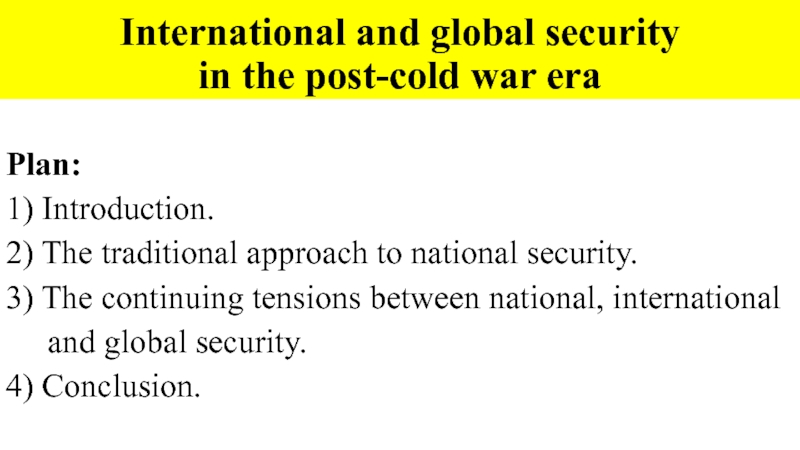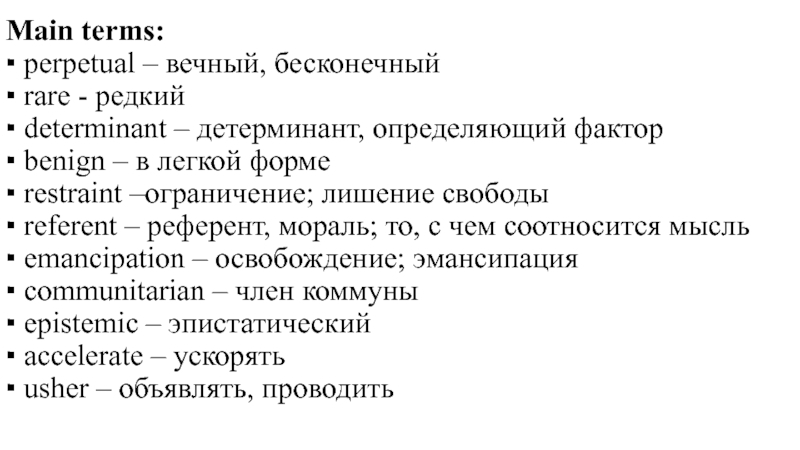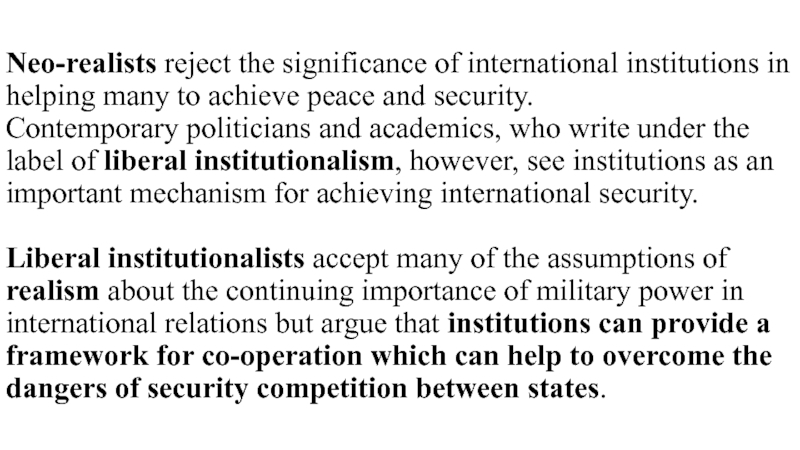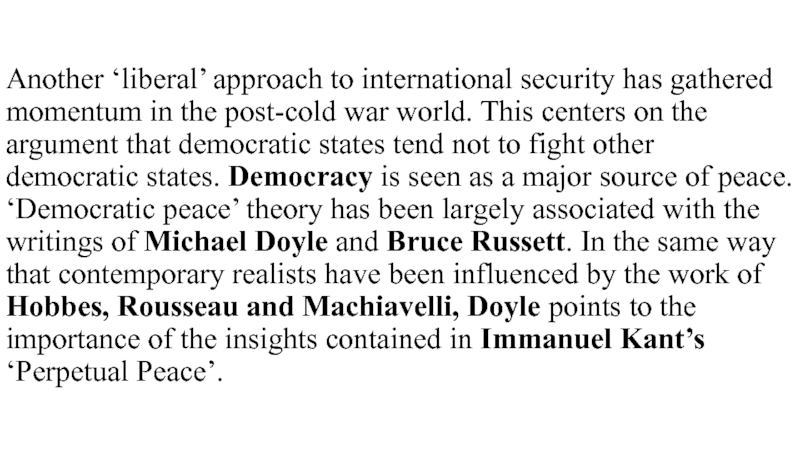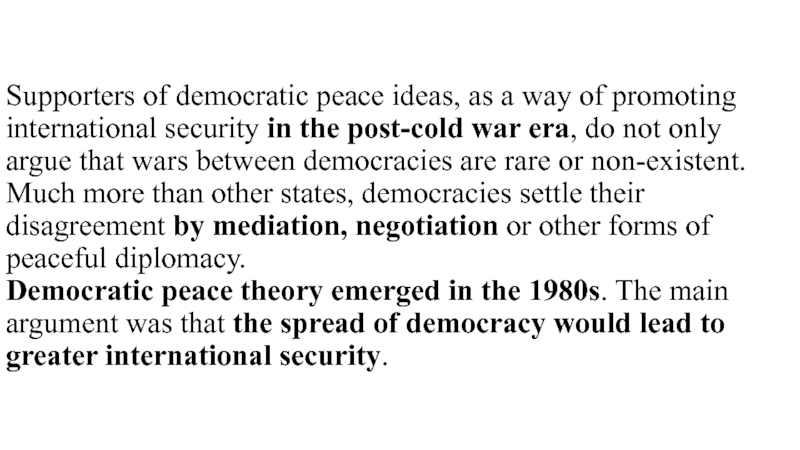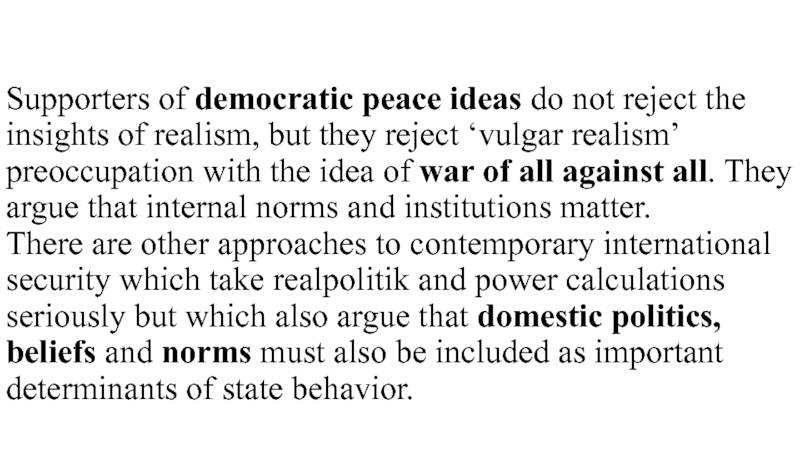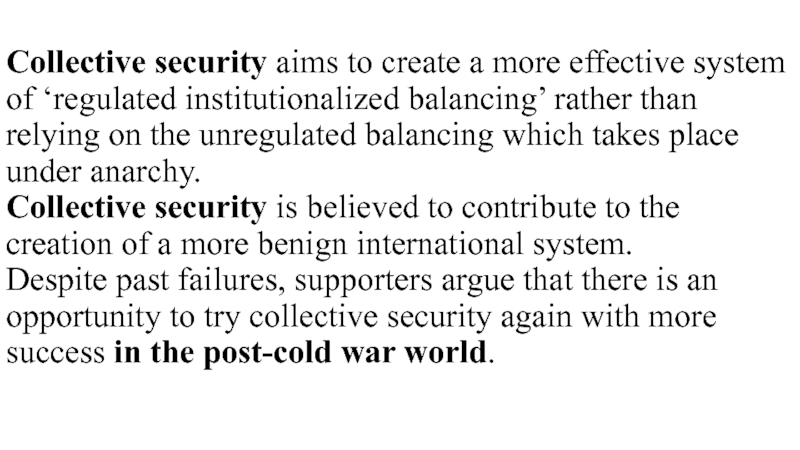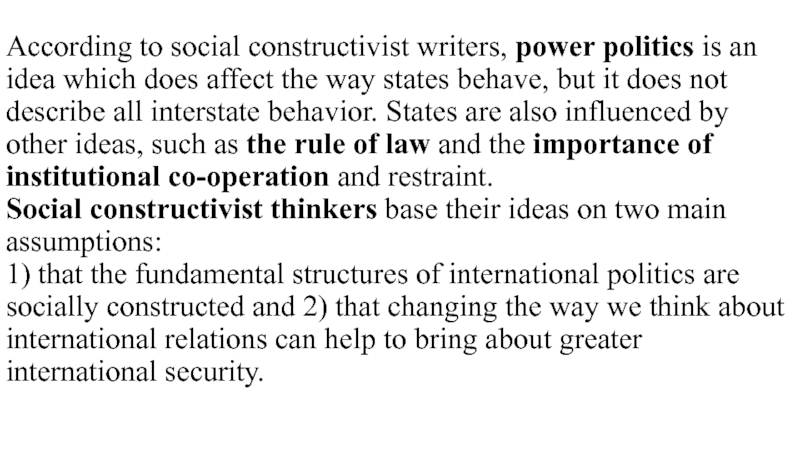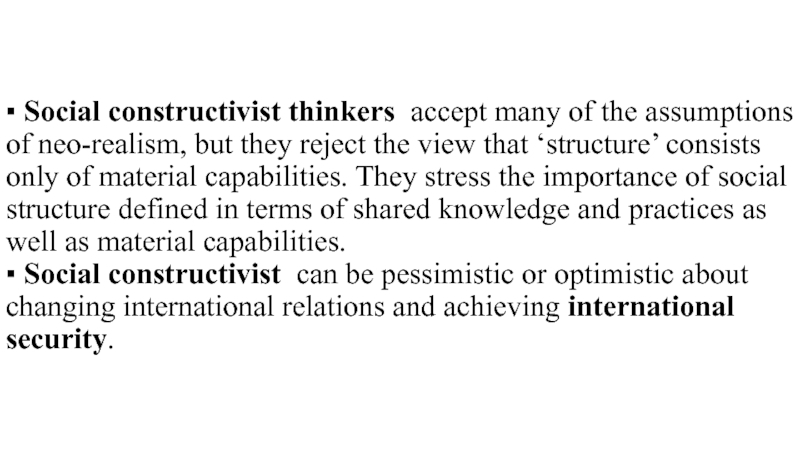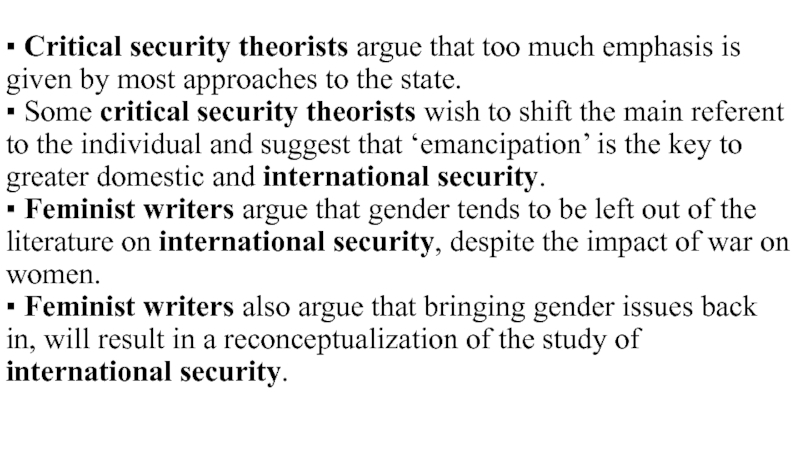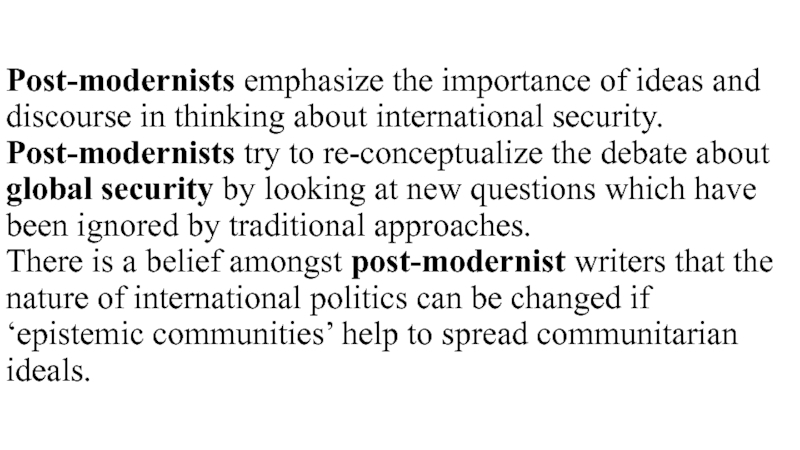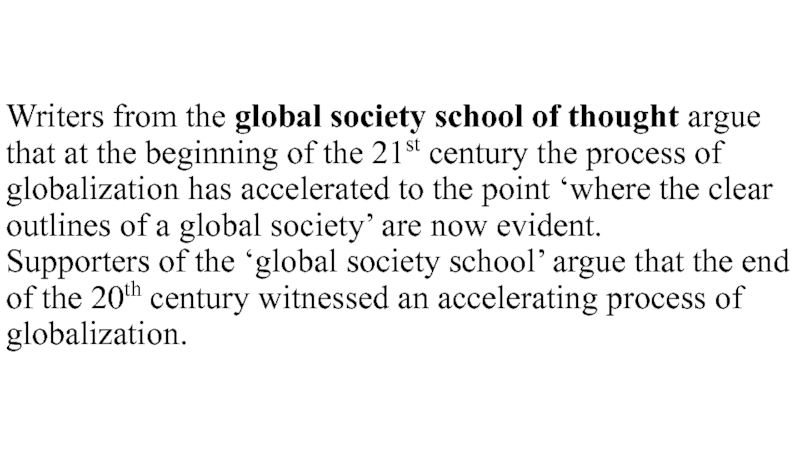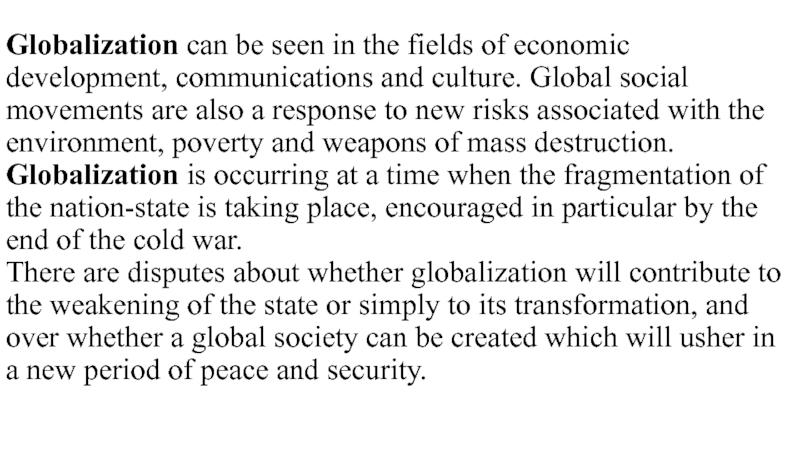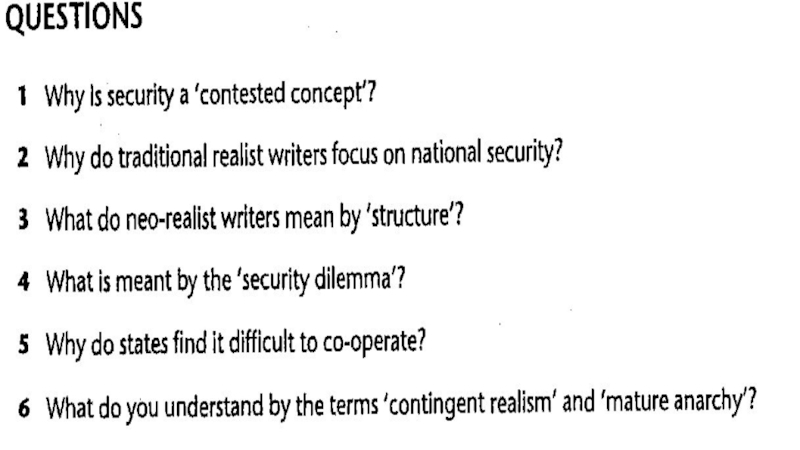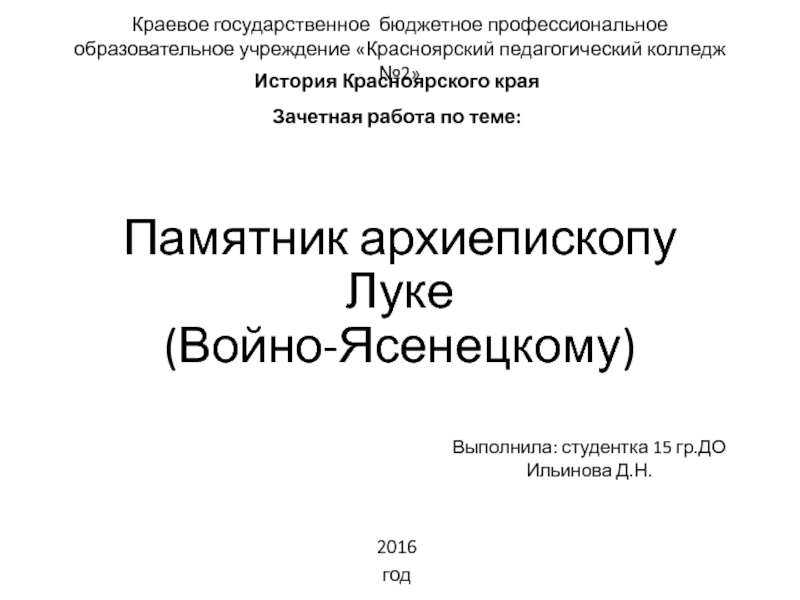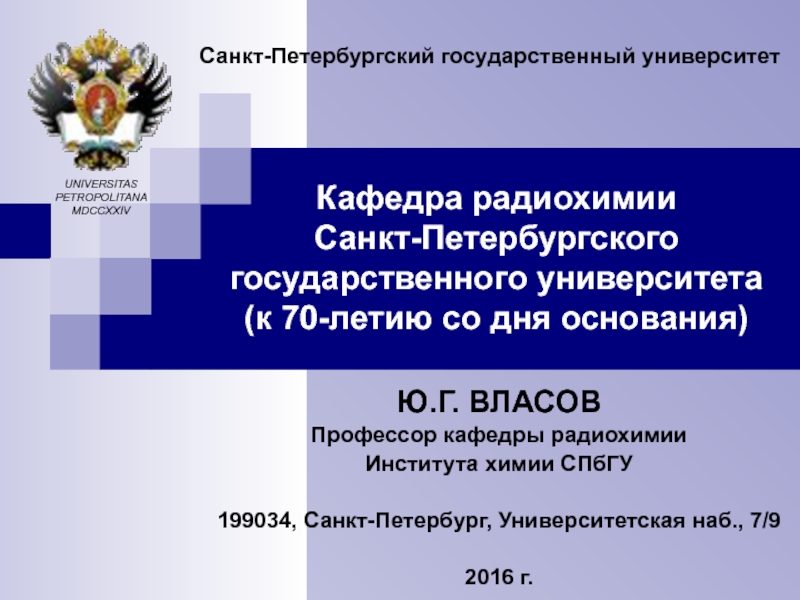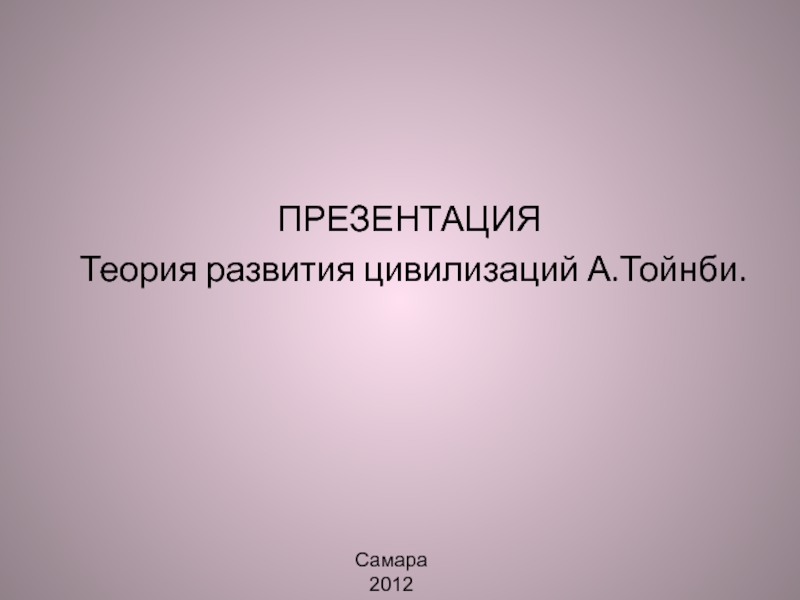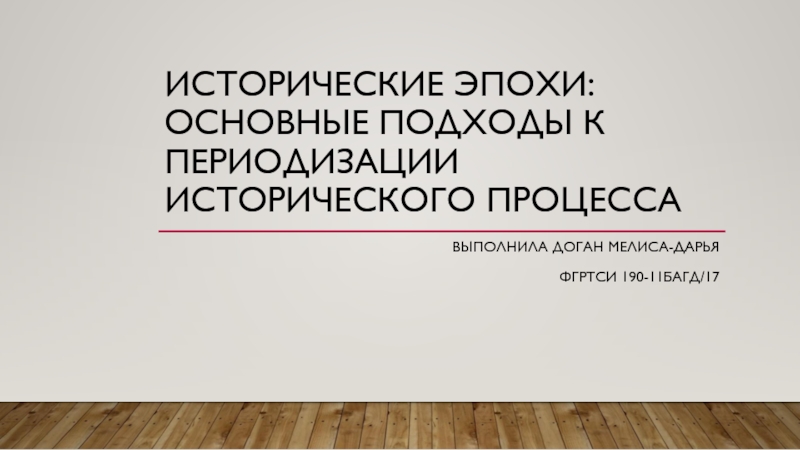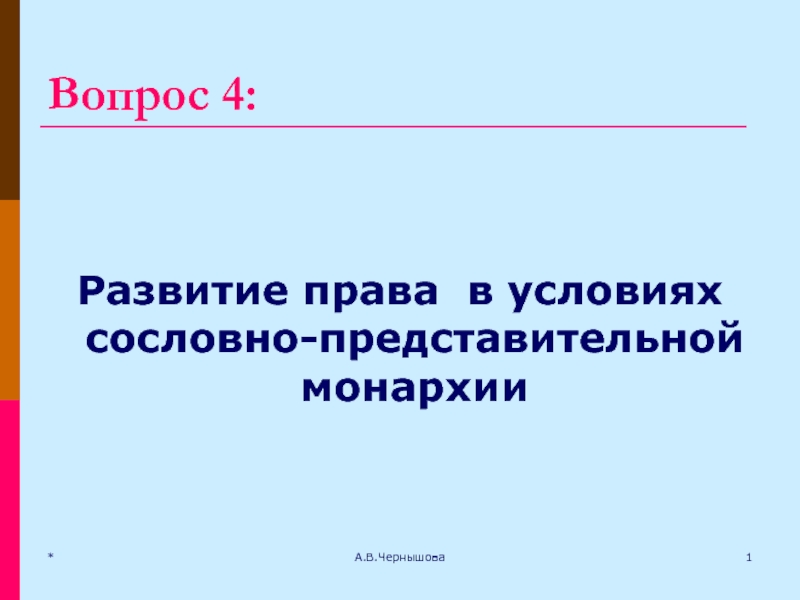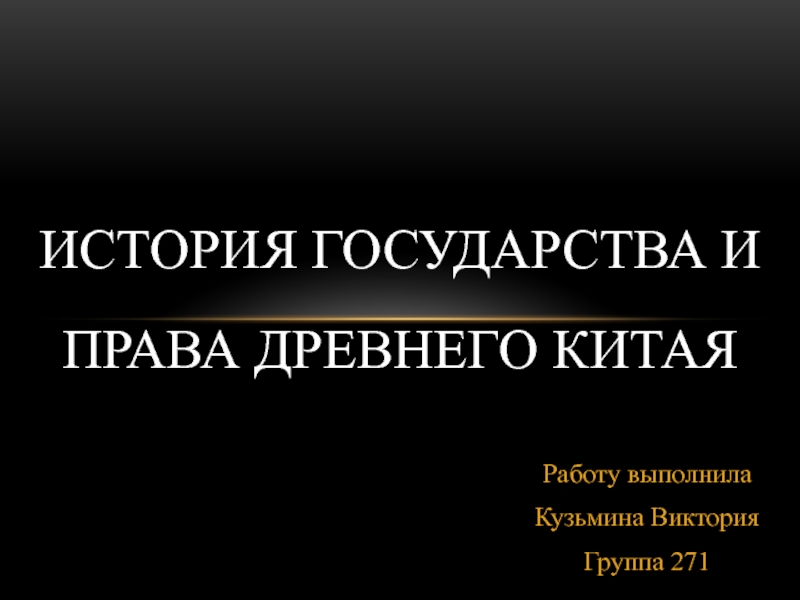traditional approach to national security.
3) The continuing tensions between national, international
and global security.
4) Conclusion.
- Главная
- Разное
- Дизайн
- Бизнес и предпринимательство
- Аналитика
- Образование
- Развлечения
- Красота и здоровье
- Финансы
- Государство
- Путешествия
- Спорт
- Недвижимость
- Армия
- Графика
- Культурология
- Еда и кулинария
- Лингвистика
- Английский язык
- Астрономия
- Алгебра
- Биология
- География
- Детские презентации
- Информатика
- История
- Литература
- Маркетинг
- Математика
- Медицина
- Менеджмент
- Музыка
- МХК
- Немецкий язык
- ОБЖ
- Обществознание
- Окружающий мир
- Педагогика
- Русский язык
- Технология
- Физика
- Философия
- Химия
- Шаблоны, картинки для презентаций
- Экология
- Экономика
- Юриспруденция
International and global security in the post-cold war era презентация
Содержание
- 1. International and global security in the post-cold war era
- 2. Main terms: ▪ perpetual – вечный, бесконечный
- 3. Neo-realists reject the significance of international institutions
- 4. Another ‘liberal’ approach to international security has
- 5. Supporters of democratic peace ideas, as a
- 6. Democratic peace theory is based on a
- 7. Supporters of democratic peace ideas
- 8. One such approach is that associated
- 9. Collective security aims to create a more
- 10. A security community is a rather different
- 11. According to social constructivist writers, power
- 12. ▪ Social constructivist thinkers accept many of
- 13. ▪ Critical security theorists argue that too
- 14. Post-modernists emphasize the importance of ideas and
- 15. Writers from the global society school of
- 16. Globalization can be seen in the fields
- 19. .
Слайд 2Main terms: ▪ perpetual – вечный, бесконечный ▪ rare - редкий ▪ determinant
– детерминант, определяющий фактор
▪ benign – в легкой форме
▪ restraint –ограничение; лишение свободы
▪ referent – референт, мораль; то, с чем соотносится мысль
▪ emancipation – освобождение; эмансипация
▪ communitarian – член коммуны
▪ epistemic – эпистатический
▪ accelerate – ускорять
▪ usher – объявлять, проводить
Слайд 3Neo-realists reject the significance of international institutions in helping many to
achieve peace and security.
Contemporary politicians and academics, who write under the label of liberal institutionalism, however, see institutions as an important mechanism for achieving international security.
Liberal institutionalists accept many of the assumptions of realism about the continuing importance of military power in international relations but argue that institutions can provide a framework for co-operation which can help to overcome the dangers of security competition between states.
Слайд 4Another ‘liberal’ approach to international security has gathered momentum in the
post-cold war world. This centers on the argument that democratic states tend not to fight other democratic states. Democracy is seen as a major source of peace.
‘Democratic peace’ theory has been largely associated with the writings of Michael Doyle and Bruce Russett. In the same way that contemporary realists have been influenced by the work of Hobbes, Rousseau and Machiavelli, Doyle points to the importance of the insights contained in Immanuel Kant’s ‘Perpetual Peace’.
Слайд 5Supporters of democratic peace ideas, as a way of promoting international
security in the post-cold war era, do not only argue that wars between democracies are rare or non-existent.
Much more than other states, democracies settle their disagreement by mediation, negotiation or other forms of peaceful diplomacy.
Democratic peace theory emerged in the 1980s. The main argument was that the spread of democracy would lead to greater international security.
Слайд 6Democratic peace theory is based on a Kantian logic – emphasizing
three elements:
▪ republican democratic representation;
▪ an ideological commitment to human rights;
▪ transnational interdependence.
Wars between democracies are seen as being rare and they are believed to settle mutual conflicts of interest without the threat or use of force more often than non-democratic states.
Слайд 7 Supporters of democratic peace ideas do not reject the insights of
realism, but they reject ‘vulgar realism’ preoccupation with the idea of war of all against all. They argue that internal norms and institutions matter.
There are other approaches to contemporary international security which take realpolitik and power calculations seriously but which also argue that domestic politics, beliefs and norms must also be included as important determinants of state behavior.
Слайд 8 One such approach is that associated with collective security ideas. Collective
security theorists take power seriously but argue that it is possible to move beyond the self-help world of realism.
Collective security is based on three main conditions:
▪ (that) states must renounce the use of military force to alter the status quo;
▪ (that) they must broaden their view of national interests to take in the interests of the international community;
▪ (that) states must overcome their fear and learn to trust each other.
Слайд 9Collective security aims to create a more effective system of ‘regulated
institutionalized balancing’ rather than relying on the unregulated balancing which takes place under anarchy.
Collective security is believed to contribute to the creation of a more benign international system.
Despite past failures, supporters argue that there is an opportunity to try collective security again with more success in the post-cold war world.
Слайд 10A security community is a rather different social structure, composed of
shared knowledge in which states trust one another to resolve disputes without war.
Social structures include material things, like tanks and economic resources.
The idea of power politics or realpolitik has meaning to the extent that states accept the idea as a basic rule of international politics.
Слайд 11 According to social constructivist writers, power politics is an idea which
does affect the way states behave, but it does not describe all interstate behavior. States are also influenced by other ideas, such as the rule of law and the importance of institutional co-operation and restraint.
Social constructivist thinkers base their ideas on two main assumptions:
1) that the fundamental structures of international politics are socially constructed and 2) that changing the way we think about international relations can help to bring about greater international security.
Слайд 12▪ Social constructivist thinkers accept many of the assumptions of neo-realism,
but they reject the view that ‘structure’ consists only of material capabilities. They stress the importance of social structure defined in terms of shared knowledge and practices as well as material capabilities.
▪ Social constructivist can be pessimistic or optimistic about changing international relations and achieving international security.
Слайд 13▪ Critical security theorists argue that too much emphasis is given
by most approaches to the state.
▪ Some critical security theorists wish to shift the main referent to the individual and suggest that ‘emancipation’ is the key to greater domestic and international security.
▪ Feminist writers argue that gender tends to be left out of the literature on international security, despite the impact of war on women.
▪ Feminist writers also argue that bringing gender issues back in, will result in a reconceptualization of the study of international security.
Слайд 14Post-modernists emphasize the importance of ideas and discourse in thinking about
international security. Post-modernists try to re-conceptualize the debate about global security by looking at new questions which have been ignored by traditional approaches.
There is a belief amongst post-modernist writers that the nature of international politics can be changed if ‘epistemic communities’ help to spread communitarian ideals.
Слайд 15Writers from the global society school of thought argue that at
the beginning of the 21st century the process of globalization has accelerated to the point ‘where the clear outlines of a global society’ are now evident.
Supporters of the ‘global society school’ argue that the end of the 20th century witnessed an accelerating process of globalization.
Слайд 16Globalization can be seen in the fields of economic development, communications
and culture. Global social movements are also a response to new risks associated with the environment, poverty and weapons of mass destruction.
Globalization is occurring at a time when the fragmentation of the nation-state is taking place, encouraged in particular by the end of the cold war.
There are disputes about whether globalization will contribute to the weakening of the state or simply to its transformation, and over whether a global society can be created which will usher in a new period of peace and security.
